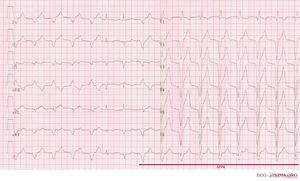Accelerated Idioventricular Rhythm: Difference between revisions
Jump to navigation
Jump to search
m (New page: {{Chapter|Ventricular Arrhythmias}} Accelerated idioventricular rhythm (AIVR) is a relatively benign form of ventricular tachycardia. It often occurs during reperfusion after a [[Myocardi...) |
(No difference)
|
Revision as of 07:55, 26 July 2007
| This is part of: Ventricular Arrhythmias |
Accelerated idioventricular rhythm (AIVR) is a relatively benign form of ventricular tachycardia. It often occurs during reperfusion after a myocardial infarction. It has a frequency of 60-120 bpm, mostly 80-100. AIVR used to be a good sign, as it made clear that reperfusion was succeeded (especially after thrombolysis, where the success cannot easily be determined without angiography). However, recently debate has started whether among patients with successful coronary intervention, AIVR is a sign of ventricular dysfunction and therefore a slightly worse prognosis.[1][2]
Examples
References
- Engelen DJ, Gressin V, Krucoff MW, Theuns DA, Green C, Cheriex EC, Maison-Blanche P, Dassen WR, Wellens HJ, and Gorgels AP. Usefulness of frequent arrhythmias after epicardial recanalization in anterior wall acute myocardial infarction as a marker of cellular injury leading to poor recovery of left ventricular function. Am J Cardiol. 2003 Nov 15;92(10):1143-9. DOI:10.1016/j.amjcard.2003.07.020 |
- Ilia R, Zahger D, Cafri C, Abu-Ful A, Weinstein JM, Yaroslavtsev S, Gilutz H, and Amit G. Predicting survival with reperfusion arrhythmias during primary percutaneous coronary intervention for acute myocardial infarction. Isr Med Assoc J. 2007 Jan;9(1):21-3.
